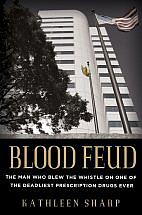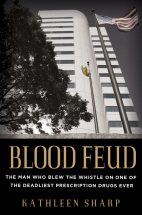"Blood Feud": How I Turned My Health Journalism Fellowship Into A Book Deal

Every once in a while, a story not only finds a reporter, it hounds her.
Such was the case with the tale I wound up writing as my latest book, Blood Feud: The Man Who Blew the Whiste on One of the Deadliest Prescription Drugs Ever, which has just been published.
[video:http://www.youtube.com/watch?v=Aqx93jcphMI]
When I became a California Endowment Health Journalism Fellow in July 2007, I had the kernel of this story in my head. My source, Mark Duxbury, had been calling me regularly for three years, cajoling me to write about his whistle-blowing case against a Johnson & Johnson unit. But I resisted; his tale seemed too incredible to be true. It was a complicated story of off-label marketing, inflated drug prices, marketing studies and doctor kickbacks, which Duxbury said amounted to $30 billion in fraud.
But in the spring of 2007, the Food and Drug Administration slapped a black-box warning on the label of erythropoietin (sold as Procrit, Epogen and Aranesp), and Congress called a hearing about the illegal promotion of the anti-anemia drugs. I scraped up enough money to take a red-eye flight to Washington D.C., and the next morning, witnessed a national scandal unfolding. I promised myself-and Duxbury-that I'd write a book about his true thriller.
How fortunate then that the fellowship came along a few months later.
I wasn't sure what to expect from the program. I had worked on newspaper staffs but had spent the last few years writing books, magazine pieces and working as a correspondent for the Boston Globe. As an independent journalist, I worked alone. Yet, when I walked into that first session of 25 boisterous CEHJF fellows and garrulous editors, I realized how much I had missed the camaraderie of the newsroom.
Indeed, the fellowship filled a huge need. It brought me into contact with other professional writers and allowed us to swat around ideas. The exercise was exhilarating, the bonhomie bracing. I especially appreciated the Doubting Thomases who didn't agree with my thesis. It turned out a lot of people couldn't believe that J&J and its partner Amgen would sell drugs in risky, unapproved ways. Later, while combing through boxes of 10,000 or so documents, I'd hear those skeptics in my head. Their voices forced me to not just double-check my facts but to arrange them in such killer detail there'd no mistaking their veracity.
I needed tools to unlock the inner workings of the multi-trillion-dollar health-care business and, in one fellowship session, listened as a physician described Phase I, II, and III medical studies. Yet he skimmed over my question about Phase IV studies. His cursory treatment of these post-marketing trials later led me into a demimonde of pharmaceutical banquets and vacation resorts, where salesmen like Duxbury's friend Dean McClellan feted big prescribers who lent their names to company-sponsored trials-known as Phase IV studies.
In 2007, such research articles almost always had rosy conclusions and were routinely published by respected medical journals. By 2009, however, McClellan showed me why these trials were biased and under fire.
As part of my fellowship project, I had set out to write a magazine article, a television segment and a book. I received a contract for the first, an assignment for the second, but was still writing the book proposal. Then the news business imploded. Before long, I had lost the TV assignment. The magazine spiked my story. This was 2009, the annus horribilis of journalism with massive lay-offs and lots of public handwringing. Suddenly, unemployed reporters were chasing foundation money just as I was. I could have despaired but instead picked up the telephone and checked in with a fellow or two. Then, I'd climb back on my "project" horse and continue riding.
By year-end 2009, I had assembled some killer details from those documents into a 50-page book outline. All I needed was some action to drive the facts forward. That's when I remembered the words of project editor Victor Merina: "Find the narrative engine of your story." Or something to that effect.
The dramatic engine of this overarching tale became the friendship between Duxbury and his pal McClellan. Blood Feud details their personal journey just as much as it describes the waste inside the U.S. health-care system.
 The reviews are starting to come in: " thoroughly researched and wildly successful ," said the Boston Globe; " .a blockbuster of a story " announced Kirkus Book Reviews. Then, there's this critique: "(The) author puts a human element on a complicated story." I like to think that the support and camaraderie I found inside the fellowship program seeped into the pages of Blood Feud.
The reviews are starting to come in: " thoroughly researched and wildly successful ," said the Boston Globe; " .a blockbuster of a story " announced Kirkus Book Reviews. Then, there's this critique: "(The) author puts a human element on a complicated story." I like to think that the support and camaraderie I found inside the fellowship program seeped into the pages of Blood Feud.

